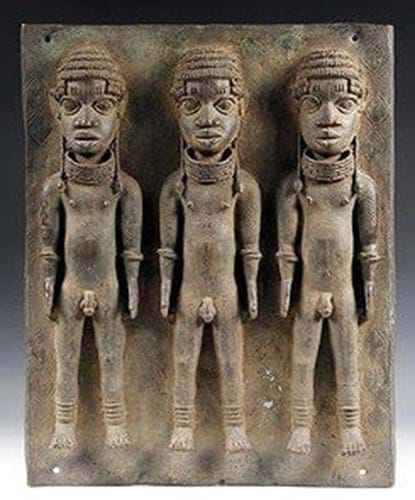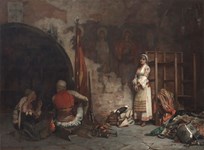
The works created by the Edo people in the Kingdom of Benin in modern-day Nigeria are deemed highly important cultural artefacts, but the fact that many were looted – including during an 1897 British expedition – means great political sensitivity now surrounds their sale.
While museums across Europe, including the British Museum, have long faced demands to return these works, private owners have now come under increasing legal and moral pressure to restitute them.
Most notably, in 2010 Sotheby’s cancelled the sale of a £4.5m Benin ivory mask and five other works after government officials in Nigeria condemned their sale as war booty (they were due to be sold by the descendants of a key participant in the 1897 expedition).
Last year an Edo bronze plaque sculpted as a fish failed to sell at Christie’s Paris against a €30,000-50,000 estimate after academics raised concerns over its sale.
The issue is compounded by the many counterfeit ‘Benin’ works and later reproductions that have flooded the market and the difficulty in establishing proof for the objects that may have left Nigeria legitimately in later eras.
The 18in (45cm) high bronze at Burstow & Hewett in Battle, which had an estimate of £10,000-15,000, came to auction having been purchased by the vendor’s late husband for $15,000 from a sale in the US in 2013. The bronze was accompanied by a laboratory report confirming the age and metal composition of the plaque. It also stated that, at the time it was purchased in 2013, it came with Nigerian export forms, although these were no longer present.
Managing partner at Burstow & Hewett Mark Ellin told ATG: “The vendor gave me the auction catalogue [from 2013] and the lab report, but couldn’t find the export document, and still can’t. She didn’t realise how important that document was until I told her last week. She then said that she may have thrown it away when she was sorting through her husband’s papers.”
Ahead of the sale Prof Dan Hicks, a curator at Pitt Rivers Museum in Oxford, raised questions over the provenance of the item and told The Times that if it was a genuine 16th century Benin bronze then “it is 99.9% sure to have been looted in the 1897 sacking of Benin City”. He added that it was a “major question” whether it was appropriate to auction such items.
Hicks subsequently spoke to the auction house and Ellin confirmed that after a “helpful and informative discussion” it was decided that, with the export licence still untraced, to withdraw the lot. “Prof Hicks has been extremely helpful and I’m very grateful for his assistance,” said Ellin. “He has offered to act as a go-between if the vendor would like to repatriate the bronze to the new museum in Benin City.”
Ellin added: “It’s become almost impossible to sell any Benin items, and this matter has certainly alerted me to that.”
Maori cloak
Ellin drew a parallel with another work that the auction house had to withdraw from sale in 2019 – a rare Maori chief’s cloak which drew a social media storm when it was offered with a conservative estimate of £3000-5000 (see ATG No 2408).
He said: “For many months before the sale I was approaching museums in the UK and New Zealand to try to find help in authenticating it. No one replied to any of my emails, or showed any interest in even looking at it, despite the fact that it had great family provenance that went back to the battle of Orakau in the late 19th century. This has been my experience in finding academic assistance. Even when I’m asking for help, I can’t find it.”
The auction record for a Benin bronze remains the premium-inclusive $4.74m paid at Sotheby’s in 2007 for a head of an oba, dated c.1575-1625, which was deaccessioned from the Albright-Knox Art Gallery in Buffalo, New York. However, a similar UK head was sold in a private treaty sale for a “substantial seven-figure sum” thought to be close to £8m by Woolley & Wallis in association with tribal art dealer Entwistle in 2016.














